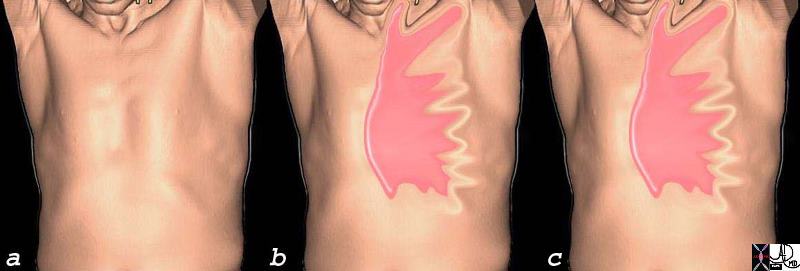Acute Coronary Syndrome
The Common Vein Copyright 2008
Definition
When the pain appears to be of cardiac origin, and reflects a more serious nature in that it lasts longer than 20 minutes, is not relieved by rest or nitroglycerine then an entity called acute coronary syndrome is entertained.
The pain of acute myocardial infarction may be very similar to the pain of angina in its character and distribution but it is not relieved by rest nor nitroglycerine. It usually arises spontaneously, but may be brought on after eating a large meal or going out into the cold. It is relentless, ongoing, often accompanied with the “angor animi” sense of doom. It may be more severe than angina but not necessarily. Associated symptoms include nausea, diaphoresis, palpitations or shortness of breath
 Acute Coronary Syndrome Acute Coronary Syndrome
(a )is prior to the event, (b) Sudden Severe Pain Pressure Discomfort (c) Unrelieved by TNG and Rest and 1 hour later |
| In the diagram above, image a represents the patient without pain before the event. Sudden and evolving chest discomfort or pressure with radiation to the neck and left arm occurs (b) that is not relieved with nitroglycerine, and remains for longer than 20 minutes (c) suggests an acute coronary syndrome.
71197c08c.800 substernal chest pain burning esophagus heart cardiac esophagitis reflux retrosternal chest pain radiating to neck and left arm unrelieved by rest and sublingual nitroglycerine myocardial infarction time hours CTscan 3D Davidoff art Courtesy Ashley Davidoff MD |
Acute coronary syndrome (ACS) is the term used to describe any one of the 3 following entities: unstable angina, non-ST elevation myocardial infarction (non Q wave MI) and ST elevation myocardial infarction (Q wave MI). Myocardial ischemia is the pathophysiological substrate for all the entities above, encompassed by the term acute coronary syndrome. Myocardial ischemia is caused by an imbalance between myocardial oxygen demand and supply secondary to coronary stenosis, obstruction, thrombosis or spasm. The chest pain in an acute coronary syndrome is caused by ischemia.
